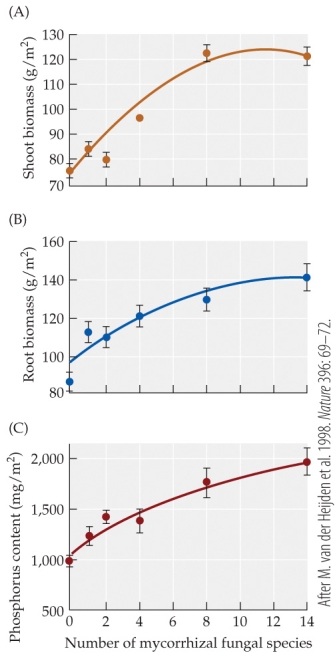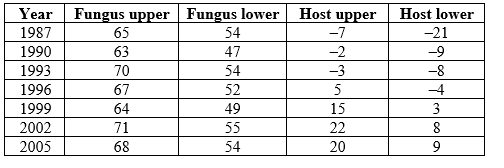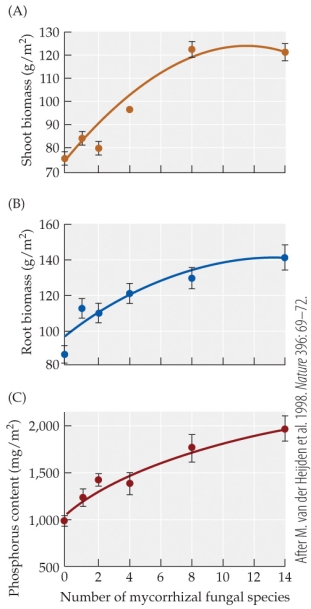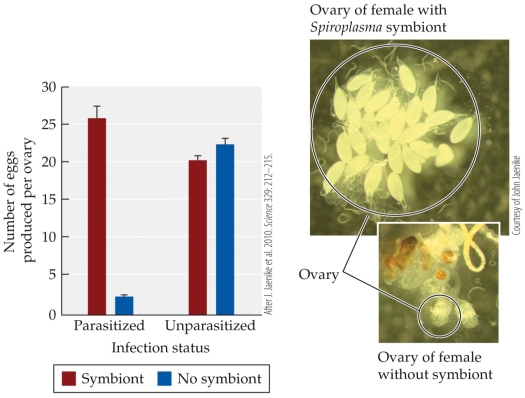Exam 15: Mutualism and Commensalism
Exam 1: The Web of Life68 Questions
Exam 2: The Physical Environment76 Questions
Exam 3: The Biosphere73 Questions
Exam 4: Coping With Environmental Variation:74 Questions
Exam 5: Coping With Environmental Variation: Energy71 Questions
Exam 6: Evolution and Ecology68 Questions
Exam 7: Life History69 Questions
Exam 8: Behavioral Ecology71 Questions
Exam 9: Population Distribution and Abundance80 Questions
Exam 10: Population Dynamics68 Questions
Exam 11: Population Growth and Regulation69 Questions
Exam 12: Predation70 Questions
Exam 13: Parasitism72 Questions
Exam 14: Competition74 Questions
Exam 15: Mutualism and Commensalism71 Questions
Exam 16: The Nature of Communities71 Questions
Exam 17: Change in Communities73 Questions
Exam 18: Biogeography70 Questions
Exam 19: Species Diversity in Communities72 Questions
Exam 20: Production73 Questions
Exam 21: Energy Flow and Food Webs76 Questions
Exam 22: Nutrient Supply and Cycling76 Questions
Exam 23: Conservation Biology73 Questions
Exam 24: Landscape Ecology and Ecosystem Management71 Questions
Exam 25: Global Ecology74 Questions
Select questions type
Refer to the figure.
 In the study by van der Heijden and colleagues comparing the effects of differing numbers of mycorrhizal species (0?-14) on the same 15 plant species, the shoot biomass of the target plants was found to
In the study by van der Heijden and colleagues comparing the effects of differing numbers of mycorrhizal species (0?-14) on the same 15 plant species, the shoot biomass of the target plants was found to
(Multiple Choice)
4.8/5  (43)
(43)
Refer to the table.
 The table contains data on the effects of symbiosis between a fly (host) and a fungus over many years. It shows the upper and lower bounds for the effects of the association; positive numbers denote net benefits and negative numbers denote net costs. (If zero is between the upper and lower bounds, consider the effect to be zero, since it is statistically indistinguishable from zero.)
-According to the table, the relationship between the fungus and the fly in 1996 was a
The table contains data on the effects of symbiosis between a fly (host) and a fungus over many years. It shows the upper and lower bounds for the effects of the association; positive numbers denote net benefits and negative numbers denote net costs. (If zero is between the upper and lower bounds, consider the effect to be zero, since it is statistically indistinguishable from zero.)
-According to the table, the relationship between the fungus and the fly in 1996 was a
(Multiple Choice)
4.8/5  (36)
(36)
When Daniel Janzen studied the ant-acacia system by removing ant colonies from some acacias, he found much lower growth rates in the acacia after ants were removed. Which other changes were seen in the responses of the acacia to ant removal?
(Multiple Choice)
4.8/5  (41)
(41)
Based on Grutter's studies, we can conclude that the presence of cleaner fish
(Multiple Choice)
4.9/5  (40)
(40)
An insect removes nectar from a flower without pollinating it. This is an example of
(Multiple Choice)
4.7/5  (41)
(41)
Which statement describes the most likely reason that a fish associated with a cleaner fish like Labroides dimidiatus does not eat the cleaner fish, even when the cleaner fish is in its mouth?
(Multiple Choice)
4.8/5  (39)
(39)
In comparing agriculture practiced by humans and by leaf-cutter ants, which of these statements is the least correct?
(Multiple Choice)
4.7/5  (36)
(36)
A bird species nests in a specific kind of tree. The tree is not harmed by the bird building its nest in the tree's branches, but the bird benefits from the shelter provided by the tree and is better able to successfully raise young. This is an example of
(Multiple Choice)
4.9/5  (38)
(38)
Suppose a fish species lives in an environment where both food and safe living space are hard to find. How would the development of mutualistic associations benefit this fish species? Would trophic or habitat mutualisms, or both, be most beneficial? Can you think of situations in nature where such associations occur?
(Essay)
4.8/5  (37)
(37)
Refer to the figure.
 What is the best description of the relationship identified by van der Heijden et al. between the average shoot biomass of the target plants and the number of mycorrhizal fungal species associated with them?
What is the best description of the relationship identified by van der Heijden et al. between the average shoot biomass of the target plants and the number of mycorrhizal fungal species associated with them?
(Multiple Choice)
4.9/5  (40)
(40)
A bear accidentally carries the seeds of a weedy plant in its fur. Transporting the seeds neither helps nor harms the bear, but is beneficial to the plant. This is an example of a(n)
(Multiple Choice)
4.8/5  (37)
(37)
Which species has been documented as imposing penalties on individuals of its mutualistic partner that are engaged in overexploitation?
(Multiple Choice)
4.9/5  (31)
(31)
Refer to the figure.
 The fruit fly Drosophila neotestacea carries a bacterial symbiont; the fly can also be infected by a nematode worm. The figure shows the number of eggs produced by female flies that are or are not infected by the nematode and that have or do not have the bacterial symbiont.
-According to the figure, the bacterial symbiont
The fruit fly Drosophila neotestacea carries a bacterial symbiont; the fly can also be infected by a nematode worm. The figure shows the number of eggs produced by female flies that are or are not infected by the nematode and that have or do not have the bacterial symbiont.
-According to the figure, the bacterial symbiont
(Multiple Choice)
4.9/5  (42)
(42)
A fungus increases the ability of a plant to grow under high-salt conditions. For the plant, this association is which type of mutualism?
(Multiple Choice)
4.9/5  (46)
(46)
Many people think leaf-cutter ant colonies provide a large benefit to rainforest ecosystems. Which of these statements does not provide evidence to support this assumption?
(Multiple Choice)
4.8/5  (39)
(39)
Would positive associations be expected to change ecosystem processes in any way, other than effects on species diversity? For example, could mutualisms or commensalisms affect nutrient cycling, photosynthesis, or other key processes? If so, explain how this might happen, with examples.
(Essay)
5.0/5  (37)
(37)
In Daniel Janzen's study of the ant-acacia association, which question was Janzen attempting to answer?
(Multiple Choice)
4.8/5  (39)
(39)
In a plant-pollinator interaction, the plant expends energy to produce colors and scents that attract the pollinator. This energy is therefore not available to use in the plant's growth and reproduction. This interaction provides evidence in favor of which statement?
(Multiple Choice)
4.8/5  (33)
(33)
Which of these scenarios represents an example of habitat mutualism?
(Multiple Choice)
4.8/5  (34)
(34)
All other factors being equal, which scenario is least likely to involve coevolution?
(Multiple Choice)
5.0/5  (41)
(41)
Showing 21 - 40 of 71
Filters
- Essay(0)
- Multiple Choice(0)
- Short Answer(0)
- True False(0)
- Matching(0)